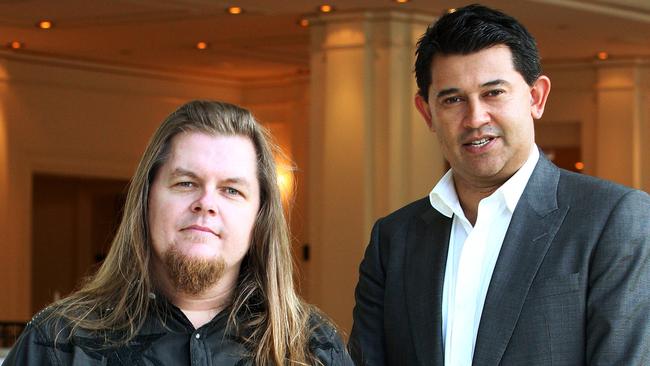SBS documentary explores how Aussie start-up Guvera failed to revolutionise music industry
Gold Coast tech company Guvera promised to revolutionise the music industry. But a new doco explores the troubled history of this audacious Aussie start-up.

Music
Don't miss out on the headlines from Music. Followed categories will be added to My News.
It was the Aussie music streaming start-up with global ambitions to challenge Spotify and Apple Music.
But the promise from Gold Coast tech company Guvera to revolutionise the music industry and save artists and labels from online pirates would vanish, and the platform disappear owing $180 million to 3000 investors.
In a new documentary two-part series Red Flag: Music’s Failed Revolution on SBS, journalist Marc Fennell explores the troubled history of this audacious Aussie start-up which launched in 2010 and was dissolved in 2017.
Guvera was the brainchild of the long-haired tattooed, motorcycle-riding Swedish-Australian programmer Claes Loberg, who joined with a Griffith University accounting graduate called Darren Herft and insurance industry computer expert Brad Christiansen to “move fast, break things”, the mantra of the start-ups boom.
Loberg’s streaming model – and his rallying call of “F… Pirates” – seeded hope at a time when labels and artists’ incomes from recorded music had been dealt a catastrophic blow by illegal file-sharing sites such as Napster, Pirate Bay, Limewire and Kazaa.

Award-winning artist Ben Lee, who kicked off his career as an indie rock teenager in the 90s when fans were paying more than $30 for CDs, says he understands why music fans became pirates.
“I think one of the gravest mistakes we made as an industry was highlighting a debaucherous lifestyle and conspicuous consumption as one of the key trademarks of music business success because I think it made people happy to see the industry take a fall,” Lee said.
“Growing up in the 80s, when I thought about what pop and rock music was, I really did have an image in my mind of cocaine, limousines, movie stars and models; that’s what we were sold.
“If we built up a latent resentment among our consumers who were then happy to take back their power and say ‘OK, you guys have had enough’, that’s partly the problem we have to answer to.
“But artists have never recovered from that and if anything, with streaming now, it’s worse.”
Guvera offered a bright, shiny future income stream.
Its bold proposition was to offer free, legal MP3 downloads which fans could download from advertiser-supported channels on the site.
So the brand paid for the “free” download and the consumer watched a commercial to access a song. The platform later switched to an ad-supported streaming service.

The founders splashed tens of millions of dollars on flashy, star-studded launches, fronted by artists including Alice Cooper and Mos Def, and rapid expansion into India, South East Asia and South America where their rivals were yet to launch.
But their application to lodge an initial public offering of listing on the Australian Stock Exchange revealed the company had negligible revenue and appeared to have burned through their investors’ cash.
Fennell said even as Guvera CEO Herft scrambled for more cash, turning to mum and dad investors when the company failed to convince venture capital funds of their vision, those inside the start-up still fervently believed “that a good idea wins.”
“I was a teenager when LimeWire and Kazaa and Napster came along and I was the target demographic for that (piracy),” he said.
“I feel we are still dealing with the legacy of that technology and what it did to our relationship to music.
“Piracy has forever changed our value proposition for music because you’ve got this generation who could so easily get it for free – and it was also a discovery platform through which you could stumble across new music.”
But artists weren’t the only ones who got hurt when Guvera collapsed. The documentary’s second half deals with the relationship between Guvera and AMMA Private Equity; Herft was the boss of both companies.
One of the key sources of funds tapped by AMMA were accounting firms who would recommend Guvera stock to their clients, mostly mum and dad investors who had never heard of music streaming.
Many lost hundreds of thousands of dollars which remain unrecouped. One victim of the collapse was famous Hervey Bay identity Keith Messer, known as the Watermelon Man.
His daughter Tracey advocated for her farmer father after James Forrestel, a representative of AMMA, engaged in “unconscionable conduct” with the then 80-year-old investor, who had been diagnosed with Alzheimer’s, to extract more money to put into Guvera even as the company was failing.
A Federal Court judge in 2018 ordered he be repaid $6.6 million.
Fennell said his final shocking discovery as he completed making the documentary was a video pitch from Herft, signalling he has returned to the Guvera board and is relaunching the company in South Korea.
“A couple of weeks before we finished the film, there was a video announcement is that Darren Herft is back and they do intend to launch next year. I’ll be fascinated to see what comes out of that because what it has been for the last couple of years is an empty shell from which investors have been trying to recoup cash.”
Red Flag: Music’s Failed Revolution premieres on October 15 at 8:35pm on SBS and SBS On Demand.
More Coverage
Originally published as SBS documentary explores how Aussie start-up Guvera failed to revolutionise music industry





